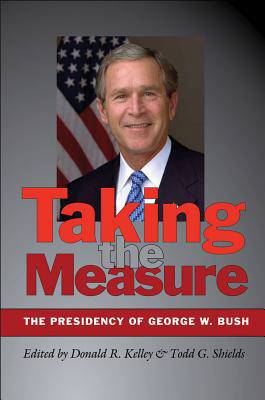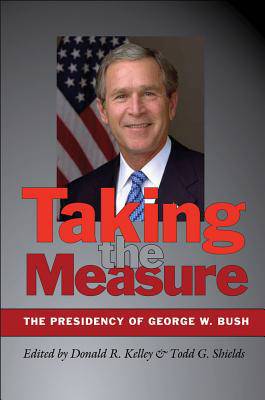
En raison d'une grêve chez bpost, votre commande pourrait être retardée. Vous avez besoin d’un livre rapidement ? Nos magasins vous accueillent à bras ouverts !
- Retrait gratuit dans votre magasin Club
- 7.000.000 titres dans notre catalogue
- Payer en toute sécurité
- Toujours un magasin près de chez vous
En raison de la grêve chez bpost, votre commande pourrait être retardée. Vous avez besoin d’un livre rapidement ? Nos magasins vous accueillent à bras ouverts !
- Retrait gratuit dans votre magasin Club
- 7.000.0000 titres dans notre catalogue
- Payer en toute sécurité
- Toujours un magasin près de chez vous
Taking the Measure
The Presidency of George W. Bush
61,45 €
+ 122 points
Description
Some of today's most prominent experts on the American presidency offer their perspectives, commentary, and analyses in this volume of studies, commissioned by the Fulbright Institute of International Relations and the Blair Center of Southern Politics and Culture, both at the University of Arkansas. With a shared focus on Bush's decision-making style, the impact of increasing partisanship, economic issues--especially after the 2008 financial meltdown--and, of course, the cumulative impact of 9/11 and the invasions of Afghanistan and Iraq, the contributors link their observations and conclusions to broader political and policy-related questions. They also take the opportunity to compare the Bush presidency with that of his successor, Barack Obama, through the latter administration's experience of disappointment in the 2010 congressional elections. The debate over the Bush legacy will not soon end, and this volume does not presume to offer the definitive, final commentary. It does, however, bridge the gap between dispassionate academic commentary written essentially for scholars and the sort of informed and unbiased analysis written for a larger public audience, contributing to the public understanding of our recent national experience. Taking the Measure: The Presidency of George W. Bush contributes significantly to the beginnings of careful, systematic consideration of the George W. Bush presidency.
Spécifications
Parties prenantes
- Editeur:
Contenu
- Nombre de pages :
- 184
- Langue:
- Anglais
- Collection :
Caractéristiques
- EAN:
- 9781623490188
- Date de parution :
- 20-08-13
- Format:
- Livre relié
- Format numérique:
- Genaaid
- Dimensions :
- 160 mm x 241 mm
- Poids :
- 362 g

Les avis
Nous publions uniquement les avis qui respectent les conditions requises. Consultez nos conditions pour les avis.





